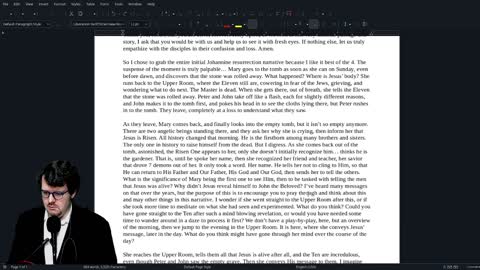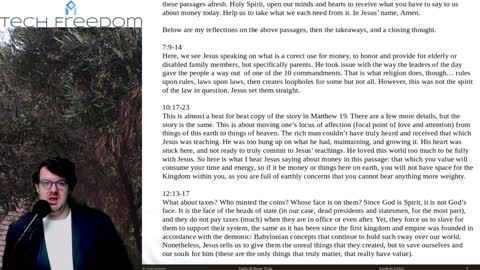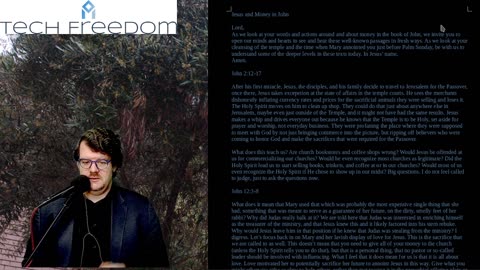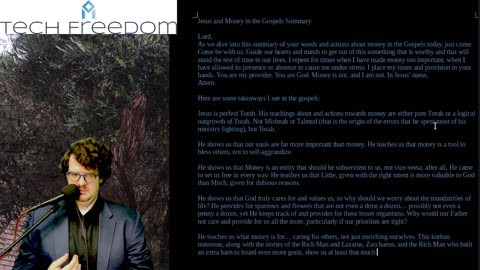
-
-
A chat about rocks' voices on Palm Sunday
 Spirituality and TechThoughts on Palm Sunday (Luke 19:37-40, TPT) As soon as he got to the bottom of the Mount of Olives, the crowd of his followers shouted with a loud outburst of ecstatic joy over all the mighty wonders of power they had witnessed. They shouted over and over, “Highest praises to God for the one who comes as King in the name of the Lord! Heaven’s peace and glory from the highest realm now comes to us!” Some Jewish religious leaders who stood off from the procession said to Jesus, “Teacher, order your followers at once to stop saying these things!” Jesus responded, “Listen to me. If my followers were silenced, the very stones would break forth with praises!” Lord, As we look at Palm Sunday again this year, I ask that you would highlight something in this passage for us. Let us see something in this familiar narrative that we might have missed in the past. Thank you, Lord. Come and embody the text for us, Holy Spirit. Amen. As the people hailed him publically, as king and Messiah, the powers-that-were got nervous. They were, on one hand, scared of what the Romans would do if the people really tried to make Jesus a literal, political king. They didn’t want to see another insurrection and a violent smack down from Rome. On the other, they were scared that they were losing power over the people who had had their leadership inflicted on them for generations. So as the Hosanna’s were happening, they told Jesus to shut the crowd up. They didn’t want blood in the streets, nor did they want to see Jesus supplant them, as they hated him for standing up to them, anyway. So what was the deal with his response? Was he being literal, or just figuratively saying that there would be no way for him to shut them up? I think he was being literal, because as the Son of God, in that moment, if humans ceased praising him, the earth itself would have cried out in some literal, audible way. I know that literal interpretations are not “sophisticated”, but these people were not sophisitcated, for the most part. Not saying that metaphors would have been wasted on them, but the blunt and literal is hard to escape, in terms of meaning, right? So, let’s imagine if the crowd would have been silenced… first, there would have been a stillness, then a clattering, as the vibrations of praise died away… it would have been, at first, a clattering, but then the stones’ actual voices would’ve been amplified in some way so that all the humans could’ve heard them praising Jesus. All would have heard the very rocks lifting up their voices to proclaim the King of Kings. However, that was not the purpose of Palm Sunday. Palm Sunday was about the People recognizing him, even over the objections of the powers that masqueraded as their leaders. The People were done with Rome. They wanted freedom, and would follow anyone that they percieved to be genuine in desiring and might be able to lead them to that goal. High taxes, oppressive military occupation with ancient enemies in the garrisons throughout Judea and the surrounding areas, and just being ruled by people who do not believe in YHWH… this was all too much, and formed a powder keg that would only take a spark to set off. Jesus never personally made those signals, even though he was very cognizant of fulfilling Prophesy regarding Messiah, but He was not about earthly politics or religion. He came to teach us how to reconnect with God, to commune with God… to tabernacle with God, if you will. But I digress… the stones would have been audible in the worship that they already were giving to God for Jesus. They do have voices. They are alive. Most of us cannot hear because we have been conditioned and taught that they do not and are not, respectively. We are programmed to believe that rocks are inanimate. They are not.213 views
Spirituality and TechThoughts on Palm Sunday (Luke 19:37-40, TPT) As soon as he got to the bottom of the Mount of Olives, the crowd of his followers shouted with a loud outburst of ecstatic joy over all the mighty wonders of power they had witnessed. They shouted over and over, “Highest praises to God for the one who comes as King in the name of the Lord! Heaven’s peace and glory from the highest realm now comes to us!” Some Jewish religious leaders who stood off from the procession said to Jesus, “Teacher, order your followers at once to stop saying these things!” Jesus responded, “Listen to me. If my followers were silenced, the very stones would break forth with praises!” Lord, As we look at Palm Sunday again this year, I ask that you would highlight something in this passage for us. Let us see something in this familiar narrative that we might have missed in the past. Thank you, Lord. Come and embody the text for us, Holy Spirit. Amen. As the people hailed him publically, as king and Messiah, the powers-that-were got nervous. They were, on one hand, scared of what the Romans would do if the people really tried to make Jesus a literal, political king. They didn’t want to see another insurrection and a violent smack down from Rome. On the other, they were scared that they were losing power over the people who had had their leadership inflicted on them for generations. So as the Hosanna’s were happening, they told Jesus to shut the crowd up. They didn’t want blood in the streets, nor did they want to see Jesus supplant them, as they hated him for standing up to them, anyway. So what was the deal with his response? Was he being literal, or just figuratively saying that there would be no way for him to shut them up? I think he was being literal, because as the Son of God, in that moment, if humans ceased praising him, the earth itself would have cried out in some literal, audible way. I know that literal interpretations are not “sophisticated”, but these people were not sophisitcated, for the most part. Not saying that metaphors would have been wasted on them, but the blunt and literal is hard to escape, in terms of meaning, right? So, let’s imagine if the crowd would have been silenced… first, there would have been a stillness, then a clattering, as the vibrations of praise died away… it would have been, at first, a clattering, but then the stones’ actual voices would’ve been amplified in some way so that all the humans could’ve heard them praising Jesus. All would have heard the very rocks lifting up their voices to proclaim the King of Kings. However, that was not the purpose of Palm Sunday. Palm Sunday was about the People recognizing him, even over the objections of the powers that masqueraded as their leaders. The People were done with Rome. They wanted freedom, and would follow anyone that they percieved to be genuine in desiring and might be able to lead them to that goal. High taxes, oppressive military occupation with ancient enemies in the garrisons throughout Judea and the surrounding areas, and just being ruled by people who do not believe in YHWH… this was all too much, and formed a powder keg that would only take a spark to set off. Jesus never personally made those signals, even though he was very cognizant of fulfilling Prophesy regarding Messiah, but He was not about earthly politics or religion. He came to teach us how to reconnect with God, to commune with God… to tabernacle with God, if you will. But I digress… the stones would have been audible in the worship that they already were giving to God for Jesus. They do have voices. They are alive. Most of us cannot hear because we have been conditioned and taught that they do not and are not, respectively. We are programmed to believe that rocks are inanimate. They are not.213 views -
What really happened during Holy Week?
 Spirituality and TechLook closer at the Gospel narratives and think about how Friday to Sunday doesn't equal 3 days and 3 nights... Matthew 21-27; Luke 19-23; Mark 11-14; John 12-18259 views
Spirituality and TechLook closer at the Gospel narratives and think about how Friday to Sunday doesn't equal 3 days and 3 nights... Matthew 21-27; Luke 19-23; Mark 11-14; John 12-18259 views -
Meditation on John 20:1-23
 Spirituality and TechA retelling with some (hopefully) thought-provoking questions.244 views
Spirituality and TechA retelling with some (hopefully) thought-provoking questions.244 views -
What did Jesus say about Money in Matthew?
 Spirituality and TechJesus has allot to say about money in the book of Matthew, and here are the references I used: 6:1-4, 21, 24; 13:21-23, 44-46; 19:12-15; 25:14-30. All references are from The Passion Translation, but you’ll have to look them up for yourselves. Lord, As we begin this series on money and what You said about it, help us to be humble. Give us fresh eyes and ears to see and hear these passages in fresh ways. Help us to apply what we learn So, what are our takeaways, here? What are you telling us about money in the book of Matthew? Thank you for being with us as we open your word, and for helping us to hear it and see it in fresh ways. Amen. One: Money is a thing to be used and used well. (vs 6:1-4 & 21; 25:14-30) Two: Money is not meant to be abused by bragging about giving to particular individuals. (6:1-4) Three: Money should not be your object in life, the more you run after it, the harder it will be to get what you want. (13:22; 19:21-25) Four: Money can deceive you, if you build your life on it, you will be disappointed. (13:22) Five: Wealth should be used generously, as our Father is generous with us. (21:12-13) How is money to be used well? It is not to be hoarded or used as a weapon against the dignity of another human being. It is to be used to benefit others and to get what truly matters, eternal life and the Kingdom of God, as the men in vs 13:44-46. How are we to relate with money? It is to be viewed as a means to an end, not an end in and of itself. It should never supplant God or seeking the best for others. Do not destroy others in order to get riches, if you do that, wealth will escape you. It is to be a servant, never a master to us, as we cannot serve two masters (6:24)259 views 1 comment
Spirituality and TechJesus has allot to say about money in the book of Matthew, and here are the references I used: 6:1-4, 21, 24; 13:21-23, 44-46; 19:12-15; 25:14-30. All references are from The Passion Translation, but you’ll have to look them up for yourselves. Lord, As we begin this series on money and what You said about it, help us to be humble. Give us fresh eyes and ears to see and hear these passages in fresh ways. Help us to apply what we learn So, what are our takeaways, here? What are you telling us about money in the book of Matthew? Thank you for being with us as we open your word, and for helping us to hear it and see it in fresh ways. Amen. One: Money is a thing to be used and used well. (vs 6:1-4 & 21; 25:14-30) Two: Money is not meant to be abused by bragging about giving to particular individuals. (6:1-4) Three: Money should not be your object in life, the more you run after it, the harder it will be to get what you want. (13:22; 19:21-25) Four: Money can deceive you, if you build your life on it, you will be disappointed. (13:22) Five: Wealth should be used generously, as our Father is generous with us. (21:12-13) How is money to be used well? It is not to be hoarded or used as a weapon against the dignity of another human being. It is to be used to benefit others and to get what truly matters, eternal life and the Kingdom of God, as the men in vs 13:44-46. How are we to relate with money? It is to be viewed as a means to an end, not an end in and of itself. It should never supplant God or seeking the best for others. Do not destroy others in order to get riches, if you do that, wealth will escape you. It is to be a servant, never a master to us, as we cannot serve two masters (6:24)259 views 1 comment -
Jesus and Money in Mark
 Spirituality and TechToday, we are going to look at Jesus’ thoughts on money from the book of Mark. The passages used are 7:9-14; 10:17-23 and 12:13-17, all from The Passion Translation, as usual. Lord, As we look through your words about money in the Gospel of Mark, I invite you to come and show us these passages afresh. Holy Spirit, open our minds and hearts to receive what you have to say to us about money today. Help us to take what we each need from it. In Jesus’ name, Amen. Below are my reflections on the above passages, then the takeaways, and a closing thought. 7:9-14 Here, we see Jesus speaking on what is a corect use for money, to honor and provide for elderly or disabled family members, but specifically parents. He took issue with the way the leaders of the day gave the people a way out of one of the 10 commandments. That is what religion does, though… rules upon rules, laws upon laws, then creates loopholes for some but not all. However, this was not the spirit of the law in question. Jesus set them straight. 10:17-23 This is almost a beat for beat copy of the story in Matthew 19. There are a few more details, but the story is the same. This is about moving one’s locus of affection (focal point of love and attention) from things of this earth to things of heaven. The rich man couldn’t have truly heard and received that which Jesus was teaching. He was too hung up on what he had, maintaining, and growing it. His heart was stuck here, and not ready to truly commit to Jesus’ teachings. He loved this world too much to be fully with Jesus. So here is what I hear Jesus saying about money in this passage: that which you value will consume your time and energy, so if it be money or things here on earth, you will not have space for the Kingdom within you, as you are full of earthly concerns that you cannot bear anything more weighty. 12:13-17 What about taxes? Who minted the coins? Whose face is on them? Since God is Spirit, it is not God’s face. It is the face of the heads of state (in our case, dead presidents and statesmen, for the most part), and they do not pay taxes (much) when they are in office or even after. Yet, they force us to slave for them to support their system, the same as it has been since the first kingdom and empire was founded in accordance with the demonic/ Babylonian concepts that continue to hold such sway over our world. Nonetheless, Jesus tells us to give them the unreal things that they created, but to save ourselves and our souls for him (these are the only things that truly matter, that really have value). Takeaways: 1) Honoring your parents when they are elderly, according to Torah is an appropriate use for money. Not doing that is sin, no matter how you slice it, no matter how selfish religious leaders try to tell you it isn’t. 2) Attachment to material riches or things keeps us from embracing that which truly matters, the Kingdom. Do not be like this young man who missed literally walking with Jesus because he couldn’t let go of worldly wealth. (there is nothing inherently wrong with money, just clinging to it for dear life). 3) Honor the laws of the country where you live. If there are taxes, pay them. As an anon-adjacent person, I struggle to write these words, as I fully believe that most of our current system is a fraud, that the IRS and tax code are and always were unconstitutional. The bottom line is, God doesn’t want or need your money, but He does desire YOU. Your time, your effort, your focus. So, give to Uncle Sam what is his, but give God His due even moreso.299 views
Spirituality and TechToday, we are going to look at Jesus’ thoughts on money from the book of Mark. The passages used are 7:9-14; 10:17-23 and 12:13-17, all from The Passion Translation, as usual. Lord, As we look through your words about money in the Gospel of Mark, I invite you to come and show us these passages afresh. Holy Spirit, open our minds and hearts to receive what you have to say to us about money today. Help us to take what we each need from it. In Jesus’ name, Amen. Below are my reflections on the above passages, then the takeaways, and a closing thought. 7:9-14 Here, we see Jesus speaking on what is a corect use for money, to honor and provide for elderly or disabled family members, but specifically parents. He took issue with the way the leaders of the day gave the people a way out of one of the 10 commandments. That is what religion does, though… rules upon rules, laws upon laws, then creates loopholes for some but not all. However, this was not the spirit of the law in question. Jesus set them straight. 10:17-23 This is almost a beat for beat copy of the story in Matthew 19. There are a few more details, but the story is the same. This is about moving one’s locus of affection (focal point of love and attention) from things of this earth to things of heaven. The rich man couldn’t have truly heard and received that which Jesus was teaching. He was too hung up on what he had, maintaining, and growing it. His heart was stuck here, and not ready to truly commit to Jesus’ teachings. He loved this world too much to be fully with Jesus. So here is what I hear Jesus saying about money in this passage: that which you value will consume your time and energy, so if it be money or things here on earth, you will not have space for the Kingdom within you, as you are full of earthly concerns that you cannot bear anything more weighty. 12:13-17 What about taxes? Who minted the coins? Whose face is on them? Since God is Spirit, it is not God’s face. It is the face of the heads of state (in our case, dead presidents and statesmen, for the most part), and they do not pay taxes (much) when they are in office or even after. Yet, they force us to slave for them to support their system, the same as it has been since the first kingdom and empire was founded in accordance with the demonic/ Babylonian concepts that continue to hold such sway over our world. Nonetheless, Jesus tells us to give them the unreal things that they created, but to save ourselves and our souls for him (these are the only things that truly matter, that really have value). Takeaways: 1) Honoring your parents when they are elderly, according to Torah is an appropriate use for money. Not doing that is sin, no matter how you slice it, no matter how selfish religious leaders try to tell you it isn’t. 2) Attachment to material riches or things keeps us from embracing that which truly matters, the Kingdom. Do not be like this young man who missed literally walking with Jesus because he couldn’t let go of worldly wealth. (there is nothing inherently wrong with money, just clinging to it for dear life). 3) Honor the laws of the country where you live. If there are taxes, pay them. As an anon-adjacent person, I struggle to write these words, as I fully believe that most of our current system is a fraud, that the IRS and tax code are and always were unconstitutional. The bottom line is, God doesn’t want or need your money, but He does desire YOU. Your time, your effort, your focus. So, give to Uncle Sam what is his, but give God His due even moreso.299 views -
Jesus and Money in Luke
 Spirituality and TechLord, As we look at your teachings about money in the Gospel of Luke today, I ask that you would help us to see and hear your words in The Word in fresh ways, and to hear your voice in it all. Give us the humility to approach your words rightly, rather than putting words into your mouth. In Jesus’ name, Amen Luke 7:41-43 Sin = debt. Money in this passage is a sign of bondage, and the debt is a metaphor for sins that without the mercy of God, could never be repaid by either man. The forgiveness that the banker shows here is emblematic of God’s mercy and grace for us in always forgiving us when we stumble. So, then, like these men, who were forgiven insurmountable debts, we should always be thankful for forgiveness from our Father, though it is a gift. Luke 12:6-7 What is Jesus saying about money, here? I feel him asking us to think about what really matters. Does money really matter? No. Your soul is the truly valuable thing, He sees us, not as dollar signs (particularly not that), but as bearers of His image, and when we are too concerned with money or the things of this world that image gets tarnished. This is not to say that He does not care about the things that affect our lives here, but because our souls are important, He will care for the rest on our behalf. Luke 12:29-34 We all need to get this straight, get it into our very cores that worry does nothing. So, why worry? God always provides for us, just as He does for the birds and the flowers in the fields. This verse is not saying that we should never try to plan ahead, but that worry about future provision need not consume us, as it does the people who do not know the Lord. In fact, he tells us to *gulp* trust him enough that we sell all we have and give that money to the poor. This action will build up our accounts in heaven, where we will never lose those resources, and it will cause our focus to shift from earthly matters of physical needs and situations to the concerns of the Kingdom, which is ours as we seek it. Luke 12:41-44 It is not about the size of a gift that we give to the King, but the spirit in which it is given. This widow had nothing else left to live on, yet she loved the Lord enough that she gave her last freely, even though in the natural, that would seem to have doomed her to starvation. The truth about that, though, is that those two small coppers wouldn’t have bought much anyway, they were likely worth a penny or two, so they wouldn’t have donw her any good had she held onto them anyway. Luke 16:1-13 This world is not ours, we have been entrusted with it as a way to prove that we are worthy of the Kingdom. This life is a test. So, the ways in which we handle situations weigh against us in the end. Use this life to make friends and bring them into the Kingdom, as the implication is that salvation may not be assured for those who do not manage this life appropriately. After all, if all we run after and focus on is the acquisition or lack of money in this life, we are not worshipping God, but Money and the sprits and systems behind it. Choose to use it, rather than be used by it. Bless others with it, rather than hoarding it. Luke 16:19ff What is Jesus saying about money, here? The rich man went to hell because he prioritized having money over caring for those around him, namely, Lazarus. He enjoyed his life, made lots of money, and ignored the sick, poor man at his own gates, not even giving him scraps. When they both died, the rich man went to hell, not because he was rich, but because he ignored Lazarus rather than helping him. This was emblematic of his life, not merely a situational issue, so he wound up in hell when he died, burning and having his memory cursed by those still alive, because he was a stingy man, living with closed fists instead of open hands. Money is not the problem, but his attitude toward it and others was. Takeaways: 1) Sin creates debt in our lives, debt that we can never repay, so we need forgiveness and need to be thankful for that forgiveness. 2) Our souls matter, not money. Therefore we need to have faith and depend on God to take care of us, rather than allowing earthly concerns and worries to tarnish our souls. 3) Our relationship with money is the important thing: if we make it our object in life (its acquisition and maintenance) to the exclusion of caring for others, it becomes a problem.334 views
Spirituality and TechLord, As we look at your teachings about money in the Gospel of Luke today, I ask that you would help us to see and hear your words in The Word in fresh ways, and to hear your voice in it all. Give us the humility to approach your words rightly, rather than putting words into your mouth. In Jesus’ name, Amen Luke 7:41-43 Sin = debt. Money in this passage is a sign of bondage, and the debt is a metaphor for sins that without the mercy of God, could never be repaid by either man. The forgiveness that the banker shows here is emblematic of God’s mercy and grace for us in always forgiving us when we stumble. So, then, like these men, who were forgiven insurmountable debts, we should always be thankful for forgiveness from our Father, though it is a gift. Luke 12:6-7 What is Jesus saying about money, here? I feel him asking us to think about what really matters. Does money really matter? No. Your soul is the truly valuable thing, He sees us, not as dollar signs (particularly not that), but as bearers of His image, and when we are too concerned with money or the things of this world that image gets tarnished. This is not to say that He does not care about the things that affect our lives here, but because our souls are important, He will care for the rest on our behalf. Luke 12:29-34 We all need to get this straight, get it into our very cores that worry does nothing. So, why worry? God always provides for us, just as He does for the birds and the flowers in the fields. This verse is not saying that we should never try to plan ahead, but that worry about future provision need not consume us, as it does the people who do not know the Lord. In fact, he tells us to *gulp* trust him enough that we sell all we have and give that money to the poor. This action will build up our accounts in heaven, where we will never lose those resources, and it will cause our focus to shift from earthly matters of physical needs and situations to the concerns of the Kingdom, which is ours as we seek it. Luke 12:41-44 It is not about the size of a gift that we give to the King, but the spirit in which it is given. This widow had nothing else left to live on, yet she loved the Lord enough that she gave her last freely, even though in the natural, that would seem to have doomed her to starvation. The truth about that, though, is that those two small coppers wouldn’t have bought much anyway, they were likely worth a penny or two, so they wouldn’t have donw her any good had she held onto them anyway. Luke 16:1-13 This world is not ours, we have been entrusted with it as a way to prove that we are worthy of the Kingdom. This life is a test. So, the ways in which we handle situations weigh against us in the end. Use this life to make friends and bring them into the Kingdom, as the implication is that salvation may not be assured for those who do not manage this life appropriately. After all, if all we run after and focus on is the acquisition or lack of money in this life, we are not worshipping God, but Money and the sprits and systems behind it. Choose to use it, rather than be used by it. Bless others with it, rather than hoarding it. Luke 16:19ff What is Jesus saying about money, here? The rich man went to hell because he prioritized having money over caring for those around him, namely, Lazarus. He enjoyed his life, made lots of money, and ignored the sick, poor man at his own gates, not even giving him scraps. When they both died, the rich man went to hell, not because he was rich, but because he ignored Lazarus rather than helping him. This was emblematic of his life, not merely a situational issue, so he wound up in hell when he died, burning and having his memory cursed by those still alive, because he was a stingy man, living with closed fists instead of open hands. Money is not the problem, but his attitude toward it and others was. Takeaways: 1) Sin creates debt in our lives, debt that we can never repay, so we need forgiveness and need to be thankful for that forgiveness. 2) Our souls matter, not money. Therefore we need to have faith and depend on God to take care of us, rather than allowing earthly concerns and worries to tarnish our souls. 3) Our relationship with money is the important thing: if we make it our object in life (its acquisition and maintenance) to the exclusion of caring for others, it becomes a problem.334 views -
Jesus and Money In John
 Spirituality and TechJesus and Money in John Lord, As we look at your words and actions around and about money in the book of John, we invite you to open our minds and hearts to see and hear these well-known passages in fresh ways. As we look at your cleansing of the temple and the time when Mary annointed you just before Palm Sunday, be with us to understand some of the deeper levels in these texts today. In Jesus’ name, Amen. John 2:12-17 After his first miracle, Jesus, the disciples, and his family decide to travel to Jerusalem for the Passover, once there, Jesus takes exception at the state of affairs in the temple courts. He sees the merchants dishonestly inflating currency rates and prices for the sacrificial animals they were selling and loses it. The Holy Spirit moves on him to clean up shop. They could do that just about anywhere else in Jerusalem, maybe even just outside of the Temple, and it might not have had the same results. Jesus makes a whip and drives everyone out because he knows that the Temple is to be Holy, set aside for prayer and worship, not everyday business. They were profaning the place where they were supposed to meet with God by not just bringing commerce into the picture, but ripping off believers who were coming to honor God and make the sacrifices that were required for the Passover. What does this teach us? Are church bookstores and coffee shops wrong? Would Jesus be offended at us for commercializing our churches? Would he even recognize most churches as legitimate? Did the Holy Spirit lead us to start selling books, trinkets, and coffee at or in our churches? Would most of us even recognize the Holy Spirit if He chose to show up in our midst? Big questions. I do not feel called to judge, just to ask the questions now. John 12:3-8 What does it mean that Mary used that which was probably the most expensive single thing that she had, something that was meant to serve as a guarantee of her future, on the dirty, smelly feet of her rabbi? Why did Judas really balk at it? We are told here that Judas was interested in enriching himself as the treasurer of the ministry, and that Jesus knew this and it likely factored into his stern rebuke. Why would Jesus leave him in that position if he knew that Judas was stealing from the ministry? I digress. Let’s focus back in on Mary and her lavish display of love for Jesus. This is the sacrifice that we are called to as well. This doesn’t mean that you need to give all of your money to the church (unless the Holy Spirit tells you to do that), but that is a personal thing, that no pastor or so-called leader should be involved with influencing. What I feel that it does mean for us is that it is all about love. Love motivated her to potentially sacrifice her future to anoint Jesus in this way. Give what you might otherwise tithe as alms to help others, rather than just tossing it in the proverbial offering plate or donating it to some larger NGO that purports to help the needy, either in your area or somewhere else.145 views
Spirituality and TechJesus and Money in John Lord, As we look at your words and actions around and about money in the book of John, we invite you to open our minds and hearts to see and hear these well-known passages in fresh ways. As we look at your cleansing of the temple and the time when Mary annointed you just before Palm Sunday, be with us to understand some of the deeper levels in these texts today. In Jesus’ name, Amen. John 2:12-17 After his first miracle, Jesus, the disciples, and his family decide to travel to Jerusalem for the Passover, once there, Jesus takes exception at the state of affairs in the temple courts. He sees the merchants dishonestly inflating currency rates and prices for the sacrificial animals they were selling and loses it. The Holy Spirit moves on him to clean up shop. They could do that just about anywhere else in Jerusalem, maybe even just outside of the Temple, and it might not have had the same results. Jesus makes a whip and drives everyone out because he knows that the Temple is to be Holy, set aside for prayer and worship, not everyday business. They were profaning the place where they were supposed to meet with God by not just bringing commerce into the picture, but ripping off believers who were coming to honor God and make the sacrifices that were required for the Passover. What does this teach us? Are church bookstores and coffee shops wrong? Would Jesus be offended at us for commercializing our churches? Would he even recognize most churches as legitimate? Did the Holy Spirit lead us to start selling books, trinkets, and coffee at or in our churches? Would most of us even recognize the Holy Spirit if He chose to show up in our midst? Big questions. I do not feel called to judge, just to ask the questions now. John 12:3-8 What does it mean that Mary used that which was probably the most expensive single thing that she had, something that was meant to serve as a guarantee of her future, on the dirty, smelly feet of her rabbi? Why did Judas really balk at it? We are told here that Judas was interested in enriching himself as the treasurer of the ministry, and that Jesus knew this and it likely factored into his stern rebuke. Why would Jesus leave him in that position if he knew that Judas was stealing from the ministry? I digress. Let’s focus back in on Mary and her lavish display of love for Jesus. This is the sacrifice that we are called to as well. This doesn’t mean that you need to give all of your money to the church (unless the Holy Spirit tells you to do that), but that is a personal thing, that no pastor or so-called leader should be involved with influencing. What I feel that it does mean for us is that it is all about love. Love motivated her to potentially sacrifice her future to anoint Jesus in this way. Give what you might otherwise tithe as alms to help others, rather than just tossing it in the proverbial offering plate or donating it to some larger NGO that purports to help the needy, either in your area or somewhere else.145 views -
Jesus and Money Wrapup
 Spirituality and TechJesus and Money in the Gospels Summary Lord, As we dive into this summary of your words and actions about money in the Gospels today, just come. Come be with us. Guide our hearts and minds to get out of this something that is worthy and that will stand the test of time in our lives. I repent for times when I have made money too important, when I have allowed its presence or absence to cause me undue stress. I place my times and provision in your hands. You are my provider. You are God. Money is not, and I am not. In Jesus’ name, Amen. Here are some takeaways I see in the gospels: Jesus is perfect Torah. His teachings about and actions towards money are either pure Torah or a logical outgrowth of Torah. Not Mishnah or Talmud (that is the origin of the errors that he spent most of his ministry fighting), but Torah. He shows us that our souls are far more important than money. He teaches us that money is a tool to bless others, not to self-aggrandize. He shows us that Money is an entity that should be subservient to us, not vice-versa, after all, He came to set us free in every way. He teaches us that Little, given with the right intent is more valuable to God than Much, given for dubious reasons. He shows us that God truly cares for and values us, so why should we worry about the mundanities of life? He provides for sparrows and flowers that are not even a dime a dozen… possibly not even a penny a dozen, yet He keeps track of and provides for these lesser organisms. Why would our Father not care and provide for us all the more, particularly if our priorities are right? He teaches us what money is for… caring for others, not just enriching ourselves. This korban nonsense, along with the stories of the Rich Man and Lazarus, Zacchaeus, and the Rich Man who built an extra barn to hoard even more grain, show us at least that much.148 views
Spirituality and TechJesus and Money in the Gospels Summary Lord, As we dive into this summary of your words and actions about money in the Gospels today, just come. Come be with us. Guide our hearts and minds to get out of this something that is worthy and that will stand the test of time in our lives. I repent for times when I have made money too important, when I have allowed its presence or absence to cause me undue stress. I place my times and provision in your hands. You are my provider. You are God. Money is not, and I am not. In Jesus’ name, Amen. Here are some takeaways I see in the gospels: Jesus is perfect Torah. His teachings about and actions towards money are either pure Torah or a logical outgrowth of Torah. Not Mishnah or Talmud (that is the origin of the errors that he spent most of his ministry fighting), but Torah. He shows us that our souls are far more important than money. He teaches us that money is a tool to bless others, not to self-aggrandize. He shows us that Money is an entity that should be subservient to us, not vice-versa, after all, He came to set us free in every way. He teaches us that Little, given with the right intent is more valuable to God than Much, given for dubious reasons. He shows us that God truly cares for and values us, so why should we worry about the mundanities of life? He provides for sparrows and flowers that are not even a dime a dozen… possibly not even a penny a dozen, yet He keeps track of and provides for these lesser organisms. Why would our Father not care and provide for us all the more, particularly if our priorities are right? He teaches us what money is for… caring for others, not just enriching ourselves. This korban nonsense, along with the stories of the Rich Man and Lazarus, Zacchaeus, and the Rich Man who built an extra barn to hoard even more grain, show us at least that much.148 views -
What else is around the Disciples' Prayer? What led to Jesus teaching on prayer, here?
 Spirituality and TechMatthew 6:5-8 Lord’s Prayer, Week 1: Intro context Father, As we approach the Disciples’ prayer today, help us to see this ever-so-familiar passage in fresh ways, help us to grasp the deep things in it, not just the simple, surface meaning. 5“Whenever you pray, be sincere and not like the pretenders who love the attention they receive while praying before others in the meetings and on street corners. Believe me, they’ve already received their reward. 6But whenever you pray, go into your innermost chamber and be alone with Father God, praying to him in secret. And your Father, who sees all you do, will reward you openly. 7When you pray, there is no need to repeat empty phrases, praying like the Gentiles do, for they expect God to hear them because of their many words. 8There is no need to imitate them, since your Father already knows what you need before you ask him. When the disciples asked Jesus how they should pray, this is how he started his teaching. Don’t try to focus attention on yourself as you pray (like the pharisees do). Instead, go as far from others as you can. Hide that you are praying, so that God will do the opposite and put you on blast for praying privately. Prayer is not meditation, muttering and murmuring repetitive phrases (like those who do not know God) will not cause God to respond more favorably to you. Be simple and to the point, because our Father knows what we need and desire before we ask. Be at peace. Speak your mind and your heart to the Lord. Even though He knows already, He likes to hear from each of us. Doesn’t that make you thankful? Even though He knows about all our needs and desires, He wants us to tell Him about them, if only to build relationship. Doesn’t that blow your mind? The God of the universe wants to hear from YOU.60 views
Spirituality and TechMatthew 6:5-8 Lord’s Prayer, Week 1: Intro context Father, As we approach the Disciples’ prayer today, help us to see this ever-so-familiar passage in fresh ways, help us to grasp the deep things in it, not just the simple, surface meaning. 5“Whenever you pray, be sincere and not like the pretenders who love the attention they receive while praying before others in the meetings and on street corners. Believe me, they’ve already received their reward. 6But whenever you pray, go into your innermost chamber and be alone with Father God, praying to him in secret. And your Father, who sees all you do, will reward you openly. 7When you pray, there is no need to repeat empty phrases, praying like the Gentiles do, for they expect God to hear them because of their many words. 8There is no need to imitate them, since your Father already knows what you need before you ask him. When the disciples asked Jesus how they should pray, this is how he started his teaching. Don’t try to focus attention on yourself as you pray (like the pharisees do). Instead, go as far from others as you can. Hide that you are praying, so that God will do the opposite and put you on blast for praying privately. Prayer is not meditation, muttering and murmuring repetitive phrases (like those who do not know God) will not cause God to respond more favorably to you. Be simple and to the point, because our Father knows what we need and desire before we ask. Be at peace. Speak your mind and your heart to the Lord. Even though He knows already, He likes to hear from each of us. Doesn’t that make you thankful? Even though He knows about all our needs and desires, He wants us to tell Him about them, if only to build relationship. Doesn’t that blow your mind? The God of the universe wants to hear from YOU.60 views








